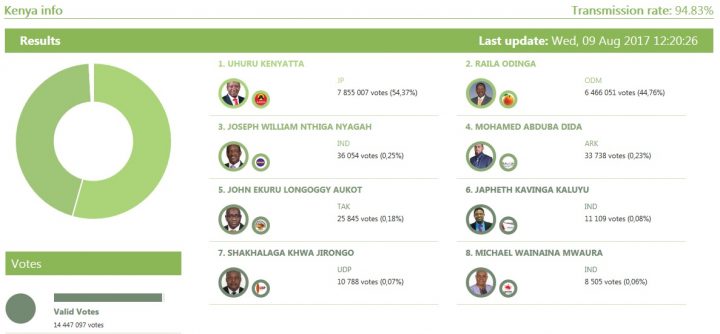With 92% of provisional results received, incumbent President Uhuru Kenyatta looks on course to be returned to power with a 55% share of the vote, with opposition leader Raila Odinga trailing on 45%.
Turn out has been high with over 70% of registered voters taking part.
Although the election has not been without violence – the most high-profile case being the murder one week ago of Chris Msando, the IT chief of the Independent Electoral and Boundaries Commission (IEBC) which is running the election and ensuring it meets the constitutional requirements and also works with the new electronic results submission system – the election has been relatively peaceful.
The electronic voter verification system has had some problems, with many people complaining that they weren’t on the electoral role despite doing everything required to be there, and the election is on course to register around 400,000 rejected votes (2.5%) for reasons not yet understood. Maybe it’s a lack of voter education and it looks suspicious, but it wouldn’t be enough to overturn the result if they were votes for Raila.
This morning, the opposition leader has been disputing the results, saying that what is published on the IEBC website doesn’t reconcile with the results announced in the polling stations. It would seem that the website appears to have been updated with results that aren’t backed up by scanned copies of the appropriate result forms signed by the candidates and agents in the polling stations. Some discrepancies are being found in investigations this morning.
Raila’s team also claimed that the dead IT manager’s credentials have been used this morning to hack the IEBC website and run certain procedures. This isn’t very good from a security point of view if his access wasn’t revoked after his murder, but who hasn’t worked in an IT environment where someone else could use another person’s username and password to do something they don’t normally have privileges for and for which bureaucratic procedures are too difficult to surpass? There may be an honest explanation.
At the end of the process, the constitution requires that all the forms are made public and everyone will be able to compare. The constitution also requires a waiting period of 3 weeks after an election before the President can be sworn in, so there is time to resolve the problems. Everyone wants the problems to be resolved peacefully.
Back in 2008, the Kenyan consciousness was collectively scarred by appalling violence that left over 1200 dead and hundreds of thousands internally displaced.
Kenya has since moved on with a new constitution and, as this election is showing, an effective electoral system that has a series of checks and balances to ensure that the results counted and read out in the polling stations around the country, and signed off by all the agents for the different candidates, are the results that appear in the new result collection system set up by the IEBC. Those results are then backed up by signed paperwork with the agents’ signatures.
The collection system has worked through the mobile telephone network which can be quite patchy in Kenya, with election officers and security staff having to travel from their rural polling stations without network, to places with better coverage in order to transmit their results.
Opposition claims of election rigging is no surprise given that Odinga almost certainly won the last two elections only to have the Presidency stolen from him by rigged results. It’s not that Raila’s party isn’t also capable of rigging, it’s just that theirs was less effective.
And honestly, anything is possible as corruption is still rife though throughout this part of East Africa. New infrastructure projects worth billions of dollars have meant a time of plenty for the politicians who like to fill their boots with public money through corrupt procurement processes. And this money doesn’t come freely, because deals with China to build the infrastructure have increased foreign debt to almost 4 trillion Kenya Shillings (40 billion US dollars), or around 50% of GDP. Ordinary Kenyans will have to pay this through taxation.
Nevertheless, for any regular traveller to Kenya it is undeniable that the country has developed under the last five years of the Kenyatta presidency. The president cannot take credit for all of the development, because the 2010 constitution devolved a lot of money to regional assemblies for local spending, but a lot of the development can be credited to him and his government. The new roads, electrification projects and trains are all testament to a country under rapid transformation from the stagnant, post-colonial, tribal dictatorship which lasted up to the late 2000s.
It’s just a pity that instead of fighting corruption and investing more in the country, something that would benefit everyone, including the corrupt, instead they prefer to take everything they can and put it in their own pockets. Of course this isn’t a phenomenon unique to Kenya, there are politicians all over the world who go into politics to serve themselves rather than those that elect them. It’s just sad to see it in a place like Kenya whose natural resources and people have the potential to be one of the best places in the world.










